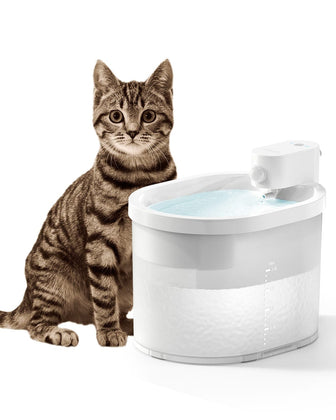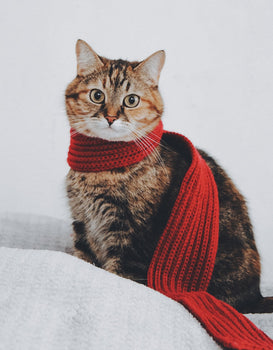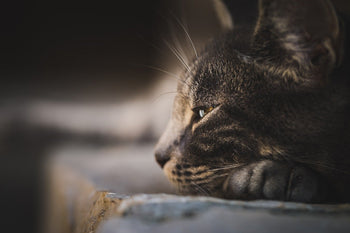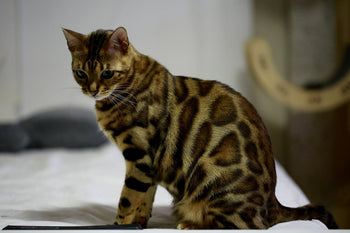Why Does My Cat Lick Me Then Bite Me
Many cat owners have experienced the confusing behavior of their feline companion licking them affectionately one moment, only to suddenly bite them the next. This can be both painful and puzzling, leaving owners wondering why their cat is behaving this way. While there are several reasons why a cat may exhibit this behavior, it is important to understand that it is a natural part of their instinctual behavior.
Why Does My Cat Lick Me Then Bite Me? Understanding Cat Behavior Cats are complex creatures, and their behavior can be difficult to interpret. However, it is important to remember that cats are natural predators, and their instincts drive much of their behavior. Licking and biting are both behaviors that are deeply ingrained in a cat's natural instincts, and they are often used as a means of communication.
Reasons for Licking and Biting There are several reasons why a cat may lick and then bite their owner. One common reason is that the cat is feeling overstimulated or overwhelmed. Cats have a sensitive nervous system, and they may become overstimulated by too much petting or attention. Another reason may be that the cat is trying to establish dominance over their owner. Cats are territorial animals, and they may use biting as a way to assert their dominance over their owner.
Key Takeaways
Cats are natural predators, and their instincts drive much of their behavior, including licking and biting.
Licking and biting can be a sign that a cat is feeling overstimulated or overwhelmed, or that they are trying to establish dominance over their owner.
Owners can manage licking and biting behavior by setting boundaries, providing appropriate outlets for their cat's energy, and strengthening their bond with their cat.
Understanding Cat Behavior
Cats are fascinating creatures with complex behaviors that can sometimes be confusing to their human companions. One common behavior that many cat owners have experienced is when their cat licks them and then bites them. Understanding why cats engage in this behavior can help owners better communicate with their feline friends and avoid any potential misunderstandings.
Licking as Grooming and Bonding
Cats are natural groomers and will often lick themselves and other cats as a way of keeping their fur clean and healthy. When a cat licks their owner, it can be a sign of affection and a way to bond with their human companion. However, sometimes cats can become overstimulated while licking and may bite as a result.
Affection and Territory Marking
Cats are territorial animals and may use licking and biting as a way to mark their territory. When a cat licks their owner, they may be leaving their scent on them as a way to claim them as their own. However, if the cat becomes agitated or overstimulated, they may switch from licking to biting as a way to assert their dominance.
Biting as Overstimulation or Play Aggression
Cats are natural predators and may engage in play aggression as a way to practice their hunting skills. When a cat becomes overstimulated during play, they may switch from gentle nibbling to more aggressive biting. It's important for owners to recognize the signs of overstimulation and end playtime before it escalates into biting.
In conclusion, cats lick and bite for a variety of reasons, including grooming, bonding, territory marking, and play aggression. Understanding these behaviors can help owners better communicate with their feline friends and avoid any potential misunderstandings.
Reasons for Licking and Biting
Cats are known for their unique behaviors, and one of them is licking and biting their owners. While it can be confusing and even painful for humans, it is essential to understand why cats exhibit this behavior.
Understanding the Behavior
Licking and biting are natural behaviors for cats, and it is a way for them to communicate with their owners. Cats use their mouths to explore their environment, and when they lick and bite, it is a sign of affection or playfulness.
Affection and Attention Seeking
Cats are social animals, and they crave attention and affection from their owners. Licking and biting can be a way for cats to seek attention and show their affection. When a cat licks its owner, it is a sign of love and trust. However, if the cat bites after licking, it could be a sign that it wants more attention or is overstimulated.
Overstimulation and Playtime
Cats are also known for their playful nature, and when they get overstimulated, they may bite their owners. Overstimulation can occur when a cat is playing too rough or when it is receiving too much attention. If a cat bites after licking, it could be a sign that it is overstimulated and needs a break from playtime.
In conclusion, licking and biting are natural behaviors for cats, and it is important to understand why they exhibit this behavior. Cats lick and bite to communicate with their owners, seek attention and affection, and show their playful nature. By understanding these reasons, owners can better understand their cats and provide them with the love and attention they need.
Tips for Managing Licking and Biting Behavior

Practical Advice for Owners
If your cat is licking and biting you, it is important to understand that this behavior is not uncommon. Cats often use their mouths to show affection, but sometimes they can become overstimulated and bite. One practical piece of advice for owners is to pay attention to your cat's body language. If you notice that your cat's tail is twitching or their ears are flattened, they may be feeling agitated and it's best to give them some space.
Another piece of practical advice is to trim your cat's nails regularly. This will help reduce the damage caused by biting and scratching. Additionally, providing your cat with plenty of toys and scratching posts can help redirect their biting behavior onto appropriate objects.
Redirecting Attention
One effective way to manage your cat's licking and biting behavior is to redirect their attention. For example, if your cat starts biting you, try offering them a toy or treat to distract them. You can also try engaging your cat in playtime to help burn off excess energy.
Another technique is to use a spray bottle filled with water to discourage your cat from biting. However, it is important to note that this technique should only be used as a last resort and should not be used to punish your cat.
Positive Reinforcement
Positive reinforcement is an effective way to encourage good behavior in cats. When your cat is showing affection without biting, be sure to praise them and offer them treats. Over time, your cat will learn that good behavior is rewarded, and they will be more likely to continue to show affection without biting.
It is important to remember that cats are individuals and what works for one cat may not work for another. If your cat's licking and biting behavior is causing problems, it may be helpful to consult with a veterinarian or animal behaviorist for additional advice.
Strengthening the Bond with Your Cat
Cats are known for their independent nature, but they also crave love and attention from their owners. Strengthening the bond between you and your cat can lead to a happier and healthier relationship. Here are some tips to help you bond with your feline friend.
Importance of a Strong Bond
A strong bond with your cat can lead to a more trusting and affectionate relationship. When your cat feels secure and loved, they are more likely to show affection and seek out your company. A strong bond can also lead to a happier and healthier cat, as they are less likely to experience stress and anxiety.
Quality Time and Interactive Activities
Spending quality time with your cat is essential for building a strong bond. Interactive activities such as playing with toys, chasing laser pointers, and hiding treats can help stimulate your cat's mind and keep them entertained. Regular playtime can also help prevent destructive behavior and encourage exercise.
Regular Grooming Sessions
Regular grooming sessions can help strengthen the bond between you and your cat. Grooming not only keeps your cat looking and feeling their best, but it also provides an opportunity for bonding. Brushing your cat's fur, trimming their nails, and cleaning their ears can all be done in a gentle and loving manner, helping to build trust and affection.
In conclusion, building a strong bond with your cat takes time and effort, but it is well worth it. By spending quality time together, engaging in interactive activities, and regularly grooming your cat, you can create a happier and healthier relationship with your feline friend.
Conclusion
In conclusion, cats lick and bite their owners for various reasons. It is important to understand your cat's behavior and body language to determine what they are trying to communicate. If your cat is licking and then biting you, it may be a sign of overstimulation or play aggression. It is important to provide your cat with appropriate outlets for their energy, such as toys and playtime.
Additionally, it is important to establish boundaries with your cat and discourage any aggressive behavior. This can be done through positive reinforcement training and redirecting their behavior to appropriate outlets. It is also important to ensure that your cat is receiving enough mental and physical stimulation, as boredom can lead to unwanted behaviors.
Overall, understanding your cat's behavior and providing them with appropriate outlets for their energy can help prevent licking and biting behavior. If you are concerned about your cat's behavior, it is always best to consult with a veterinarian or animal behaviorist for further guidance.
Frequently Asked Questions
What does it mean when a cat gives you licks followed by bites?
Cats are known for their unpredictable behavior, and licking followed by biting is one such behavior. This behavior could indicate excitement, anxiety, or aggression. It's essential to observe your cat's body language and behavior to understand what they are trying to communicate.
Is it normal for a cat to gently bite after showing affection?
Yes, it's normal for cats to nibble or bite gently after showing affection. It's their way of showing love and affection towards their owners. However, it's crucial to differentiate between gentle bites and aggressive bites, which could be a sign of stress or anxiety.
What are the reasons behind a cat's mixed behavior of nuzzling and biting?
Cats nuzzle to show affection and mark their territory. However, biting could indicate overstimulation, anxiety, or aggression. It's essential to observe your cat's behavior and body language to understand the reason behind their mixed behavior.
How should one interpret a cat's licking and biting during a purring session?
Cats purr when they are happy or content. Licking and biting during purring could indicate overstimulation or excitement. It's essential to monitor your cat's behavior and body language to understand their intent.
What prompts a cat to suddenly bite after cuddling?
Cats could bite after cuddling due to overstimulation, anxiety, or aggression. It's essential to observe your cat's behavior and body language to understand the reason behind their sudden biting.
How can I understand and respond to my cat's licking and unexpected biting?
Understanding your cat's behavior and body language is crucial to responding appropriately. If your cat is overstimulated or anxious, it's best to give them space and avoid petting or cuddling them. If your cat is showing signs of aggression, it's essential to seek professional help from a veterinarian or animal behaviorist.

















